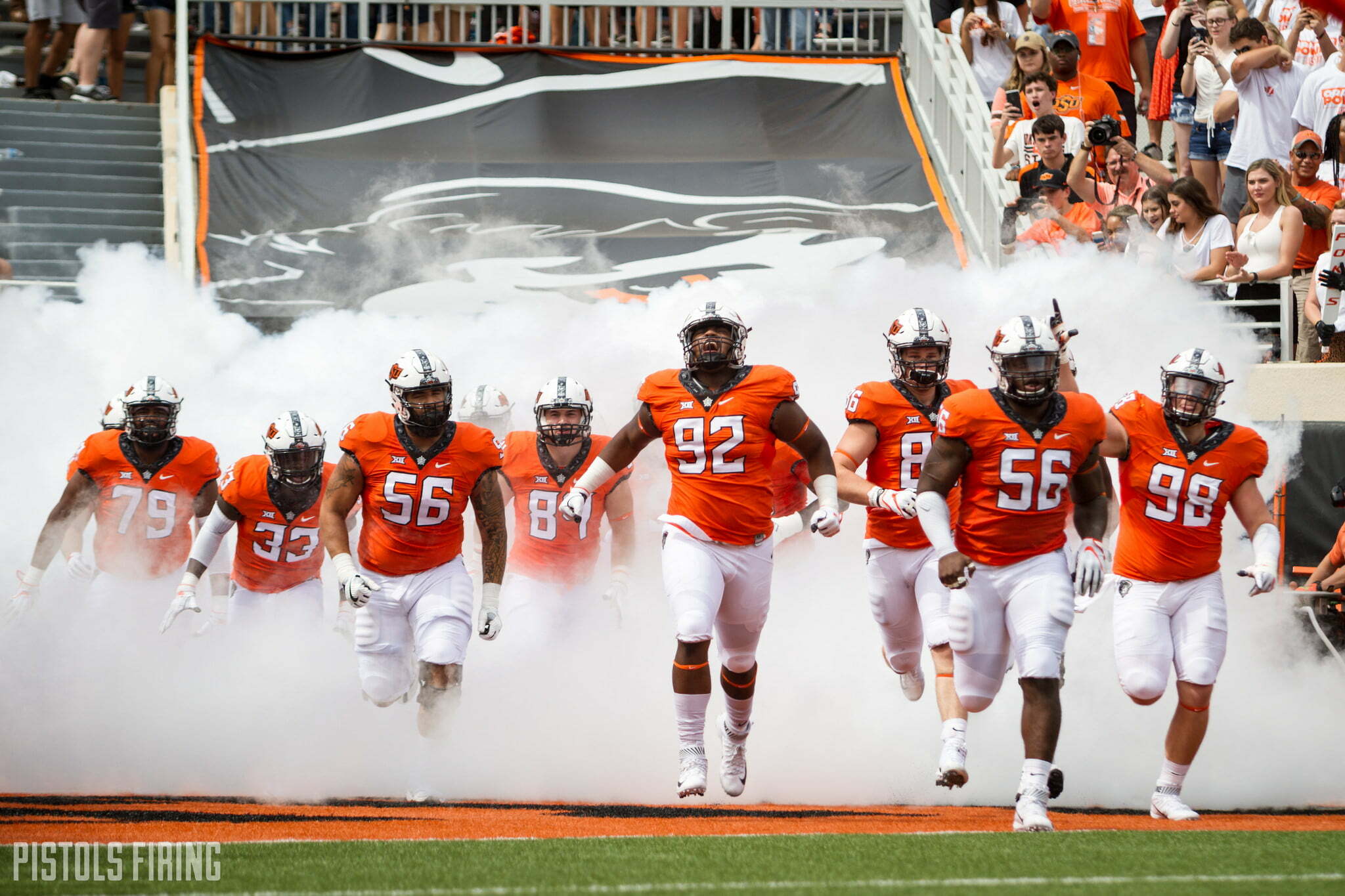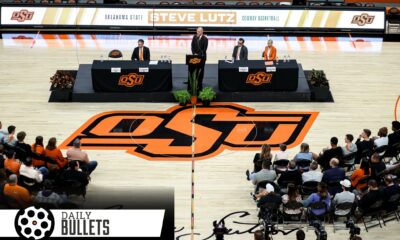Football
Boise Outcome Doesn’t Prove It, but OSU Should Schedule Even Bigger Home and Homes
Boise is great, but Oklahoma State can swing even harder in the nonconference slate.

I’m trying to not let the outcome of Saturday’s tilt with Boise State color my view of either who OSU is as a football team this year or what it should do as a football program in the future. That is proving itself to be difficult. We necessarily make decisions based on past outcomes or results, and it becomes incredibly easy to look at a 44-21 win over a ranked team and say, LET’S PLAY ALL THE RANKED TEAMS THEN WE’LL WIN EM ALL AND BE RANKED AHEAD OF BAMA.
But my argument here is not one based on wins and losses. I’ve been arguing this for years, and the crux of it is this: It is so unlikely that OSU would make it to the College Football Playoff in a given year that you aren’t really eliminating risk by not scheduling big nonconference games. Plus, a win can boost your profile in a reloading year or catapult you into the playoff discussion in years like 2017. Also, not sure if you guys remember this, but games against unranked Group of Five teams are not exactly auto-Ws! Even at home.
Before we talk about why these ranked-on-ranked games are great, let’s dive a little deeper into the CFB Playoff discussion. That’s one of two reasons you wouldn’t schedule one of these things, right? The other — and maybe more prominent for Mike Gundy — is keeping your team healthy going into Big 12 play. That’s actually a more valid and compelling pitch to me than the CFP stuff.
Look, if I’m Alabama I’m not scheduling a nonconference game against a school without at least two (if not three) directions in its name. Why would you? You get the benefit of the doubt in any and all situations (which you deserve), and even if you go 3-0 against north, central, and southwestern Louisiana and put up a decent showing in the SEC, you’re in. Why would you ever schedule Florida State or Michigan?
If you’re Oklahoma State, though, you don’t get the benefit of the doubt. You have to prove something. If we’ve learned anything from the first few years of the CFB Playoffs, it’s this. Established programs simply have to not disprove something. Unestablished programs (I guess OSU qualifies) have to prove something.
So if you play three cupcakes and go 8-1 in the Big 12, you’re probably out anyway because your noncon can be leveraged against you. Howevah …. if you play a Boise State or a Michigan State or a Miami in the nonconference and pull off the win, all of a sudden you’re seen in a different light.
That’s tangential, though, and only a supporting argument for my stance. The real argument here is that unless you’re one of five schools (and OSU is not), college football is more about the moments than it is the postseason. OSU thumping Boise in Stillwater on Saturday as Justice delivered the knockout punch stiff arm was a moment. It was awesome. It meant something.
My friends and I still talk about the Georgia game in 2009. It was what qualifies in OSU world as an all-timer outside of the Big 12 slate. And if you lose, so what? You can still win the Big 12. You know what you have as a team. There is a barometer. What OSU team this century would have screwed itself when it comes to the postseason by playing and losing a good nonconference game? Maybe the 2011 team. So one time in the last 20 years? I’ll take my chances there because of what a big game like that brings to the table.
And what exactly does a big game like that bring to the table?
It brings palpable excitement. A non-COOP induced buzz that you can’t purchase and isn’t worth squashing for the sake of a possible CFP berth or better health going into the Big 12. It snaps a fan base (and a team?) that is semi-apathetic after two snoozers into the reality of the season.
Finding the right nonconference team is tricky, too. You don’t want to play, say, Georgia Tech because that does nothing for you. If you lose, you shouldn’t have lost. If you win, nobody cares. You don’t really want to play Clemson, either. Boise was a great team to play because it has a good squad in 2018. But I’m not sure it was a scheduling win. Was there that much difference between scheduling Pitt and scheduling Boise?
I understand that it’s difficult to schedule good series out into the future (cc: Mike Boynton), but the reality here is that if you’re scheduling Michigan or USC or Ole Miss, those are games people (both fans and playoff committees) get excited about because of perception, current form be damned. Just getting those teams on the schedule is a W for your program.
An aside on why fan excitement is important because I’m sure some people are saying, Just collect me some Ws, baby. Who cares about the patrons! Well, one-third of OSU’s 2016 football revenue ($42M) came from season ticket sales. Even more when you throw in concessions, contributions and merchandise. Fan excitement matters and not just so blogs can get more page views.
OSU plays Oregon State and Arizona State in the next few years. They return the favor and visit the great state of Boise in 2021. These are solid games against good teams, but Oklahoma State can and should probably be scheduling up a tad. Boise was great. I’d like to see even better. The Georgia back-and-forth in 2007 and 2009 should be the blueprint.
There are other factors outside of your control when scheduling these games. Teams don’t want to go home and home because there is money — like $5 million a pop! — to be made by going with a neutral site game against a great team. But if TCU can get Ohio State to dance in Arlington, Texas, Oklahoma State can surely turn its nonconference difficulty level up a few notches.
While we’re here, let’s look at TCU. Let’s say they scheduled Ohio instead of Ohio State and waltzed into the Big 12 at 3-0 with wins over Southern, Southern Methodist and Ohio. Ok. Are they going to run the table in the Big 12? No. Are they going to go 8-1? Maybe. But even if they do they have to turn around and beat OU or OSU or WVU in the Big 12 title game to get to the playoff. Instead, they shot their shot against tOSU and came up empty. That’s ok. Schools too often try and mitigate all the risk they possibly can. This isn’t a political campaign. Let’s play some big-time games!
There are so few of these tilts in a given year that the ones you play should be as memorable and as interesting as possible. I’m not saying you should actively attempt to schedule three top-10 teams, but there are just so few downsides (and so much upside!) to calling Notre Dame or Florida or LSU that I wish teams like OSU and TCU did it more. Heck, maybe they have. Maybe Oklahoma State is the Butler basketball of Power Five football teams. Maybe nobody wants to stand in proximity of The Mullet.
I know there are no easy avenues to make this happen, and I know as a team and as a head coach that maybe you don’t even want it. I’m selfish as a fan of the sport, though. I crave ranked-on-ranked matchups. Cool(ish) September afternoons and evenings with the smell of fall somewhere off in the distance where you look across the field with a striped stadium popping and say, This is what we’ve got. This is who we are. Let’s see if it’s enough. Let’s play a big-time college football game.

-

 Football5 days ago
Football5 days agoNotebook: Stribling Back, Clay Squatting 635 and Glass Fitting in Well
-

 Daily Bullets4 days ago
Daily Bullets4 days agoDaily Bullets (Apr. 19): Bedlam Gametime Moved, Cowboy Receivers Breed Confidence
-

 Football4 days ago
Football4 days agoFour-Star Wide Receiver Jaden Perez Commits to Oklahoma State
-

 Wrestling5 days ago
Wrestling5 days agoOSU Wrestling: After Disappointing College Career Ending, Daton Fix Eyes Bigger Goal at Olympic Team Trials






